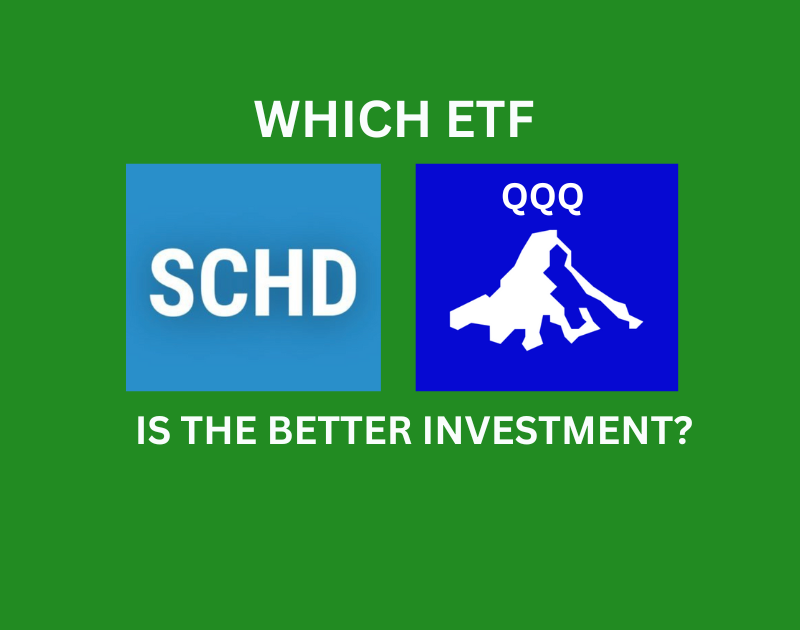If you’re looking to build wealth through ETFs, you’ve probably come across SCHD vs QQQ in your research. These two funds are among the most popular in the investing world, but they serve very different purposes. SCHD (Schwab U.S. Dividend Equity ETF) focuses on high-quality dividend stocks, while QQQ (Invesco QQQ Trust) tracks the tech-heavy Nasdaq-100.
So, which one should you invest in? The answer depends on your investment goals, risk tolerance, and time horizon. In this post, we’ll break down SCHD vs QQQ in terms of performance, risk, dividends, fees, and historical returns to help you make an informed decision.
What Are SCHD and QQQ?
SCHD: The Dividend Growth ETF
SCHD tracks the Dow Jones U.S. Dividend 100 Index, focusing on large-cap U.S. companies with strong dividend histories. It is a favorite among income-focused investors because of its stability and high dividend yield.

Key Features of SCHD:
- Expense Ratio: 0.06%
- Dividend Yield: ~3.5% (as of recent data)
- Holdings: ~100 high-quality dividend-paying stocks
- Top Sectors: Financials, Consumer Staples, Healthcare
QQQ: The Growth-Oriented ETF
QQQ, on the other hand, tracks the Nasdaq-100 Index, which consists of 100 of the largest non-financial companies listed on the Nasdaq exchange. This ETF is heavily weighted toward technology, making it a go-to choice for investors seeking high growth potential.

Key Features of QQQ:
- Expense Ratio: 0.20%
- Dividend Yield: ~0.6% (as of recent data)
- Holdings: 100 of the largest non-financial Nasdaq-listed stocks
- Top Sectors: Technology, Consumer Discretionary, Communication Services
Performance Comparison: SCHD vs QQQ
One of the most crucial factors in choosing an ETF is its historical performance. Here’s how SCHD and QQQ have performed over the past decade:
| ETF | 5-Year CAGR | 10-Year CAGR |
|---|---|---|
| SCHD | ~12% | ~12% |
| QQQ | ~20% | ~19% |
💡 Takeaway: QQQ has historically outperformed SCHD in total returns, thanks to its high exposure to growth stocks like Apple, Microsoft, and Nvidia. However, SCHD provides more stability and lower volatility.
Visualizing Performance
📈 Morningstar’s 10-year growth for $SCHD for the period ending January 31st, 2025:

A $10,000 investment in $SCHD would have grown to approximately $29,021 over the last 10 years.
📈 Morningstar’s 10-year growth for $QQQ for the period ending January 31st, 2025:

A $10,000 investment in $QQQ would have grown to approximately $54,817 over the last 10 years.
Risk and Volatility: Which ETF Is Safer?
Risk is an essential factor when choosing between SCHD vs. QQQ. QQQ is inherently riskier due to its exposure to the tech sector, which tends to be more volatile.
| Metric | SCHD | QQQ |
| Beta | ~0.9 | ~1.3 |
| Max Drawdown (2022) | -11% | -33% |
| Standard Deviation | Lower | Higher |
💡 Takeaway: If you want smoother returns and lower downside risk, SCHD is the better choice. However, if you’re comfortable with volatility in exchange for higher potential returns, QQQ is attractive.
SCHD vs QQQ Dividends: SCHD Is the Clear Winner
Dividends are another significant consideration when comparing SCHD vs. QQQ.
- SCHD Dividend Yield: ~3.5% (significant income for retirees and income investors)
- QQQ Dividend Yield: ~0.6% (low yield due to growth stock focus)
💡 Takeaway: If passive income is your goal, SCHD is the superior choice.
SCHD vs QQQ: Expense Ratios & Fees
Fees matter, especially for long-term investors. Here’s how SCHD and QQQ compare:
- SCHD Expense Ratio: 0.06%
- QQQ Expense Ratio: 0.20%
💡 Takeaway: SCHD is much cheaper to hold over the long run. The higher expense ratio of QQQ can eat into your returns over time.
Who Should Invest in SCHD?
✅ Dividend-focused investors looking for passive income
✅ Conservative investors seeking stability and lower volatility
✅ Retirees or those nearing retirement who need consistent cash flow
✅ Long-term investors who want dividend reinvestment for compounding
Who Should Invest in QQQ?
✅ Growth-oriented investors willing to handle higher volatility
✅ Younger investors with a long time horizon
✅ Investors who believe in the long-term dominance of tech stocks
✅ Those seeking high capital appreciation instead of dividends
SCHD vs QQQ Final Verdict: Which ETF Should You Choose?
| Factor | Winner |
| Growth Potential | QQQ |
| Stability & Lower Risk | SCHD |
| Dividend Yield | SCHD |
| Expense Ratio | SCHD |
| Tech Exposure | QQQ |
📌 Bottom Line: If you’re focused on capital appreciation and don’t mind volatility, QQQ is the better choice. But if you value steady income, lower risk, and long-term dividend growth, SCHD is a great option.
🚀 Pro Tip: Some investors hold both SCHD and QQQ to balance growth and stability. A split can provide strong long-term returns with reduced volatility.
Final Thoughts
Choosing between SCHD vs. QQQ ultimately depends on your financial goals. Do you want long-term growth with higher volatility? Go for QQQ. Prefer stability and dividend income? SCHD is your best bet.
What’s your preference? Drop a comment below and let’s discuss! And if you found this comparison helpful, don’t forget to share this post with fellow investors!
